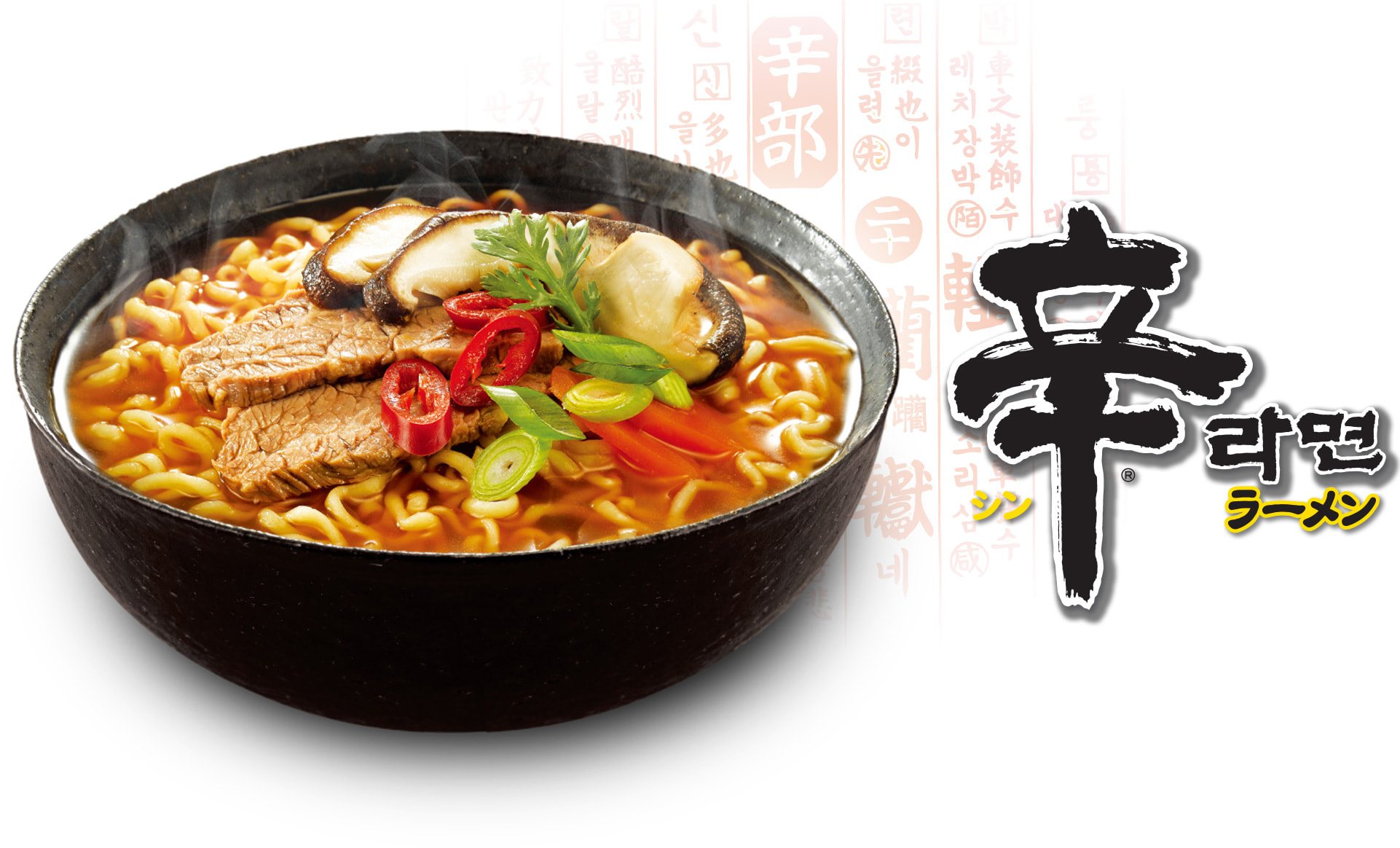想知道為什麼韓國泡麵會紅遍全世界嗎?🍜
從首爾到舊金山,到處都能看到農心的辛拉麵。今天
要帶你一起了解農心如何靠著品牌力與韓流熱潮打進全球市場,
也順便學會實用的英文單字與句型!
🎧Apple Podcast | Spotify
💬 Dialogue|英語對話練習
🎬 Scene:
Anna 和 Kevin 正在咖啡廳裡聊天。
討論他們在 YouTube 上看到了一支新的韓國泡麵廣告。
English Dialogue
Anna: Hey Kevin, have you noticed how popular Nongshim noodles have become lately?
Kevin: Yeah, especially Shin Ramyun! I see it everywhere now — even in American supermarkets.
Anna: It’s crazy. I heard Nongshim holds over 50% of South Korea’s instant noodle market.
Kevin: That’s impressive! And about 40% of their sales now come from overseas.
Anna: Wow, so globalization really works when the product has strong cultural appeal.
Kevin: Totally! Plus, their marketing with K-pop and Netflix movies helps a lot.
Anna: Oh yeah, like the KPop Demon Hunters collaboration — those limited-edition packs sold out fast!
Kevin: I read they’re even building a new factory in Busan to expand exports to Europe.
Anna: Europe? That’s interesting! Korean food is becoming so trendy there.
Kevin: For sure. It’s amazing how a simple bowl of noodles can connect people worldwide.
Anna: True! And it’s a good reminder — success often comes from mixing culture and quality.
繁體中文翻譯
Anna: Kevin,你有注意到最近農心泡麵變得超紅嗎?
Kevin: 有啊,尤其是辛拉麵!現在連美國超市都看到。
Anna: 太誇張了,我聽說農心在韓國泡麵市場佔超過一半!
Kevin: 好厲害喔!而且現在有四成的營收來自海外。
Anna: 哇~果然有文化魅力的產品更容易走向全球。
Kevin: 沒錯!再加上他們和 K-pop、Netflix 電影的行銷合作,真的很聰明。
Anna: 對啊,像那個《KPop Demon Hunters》的限定包裝,幾分鐘就搶光!
Kevin: 我還看到他們在釜山蓋新工廠,要擴展到歐洲市場。
Anna: 歐洲?韓國美食那邊也越來越流行了耶。
Kevin: 真的,一碗泡麵居然能把全世界的人連在一起。
Anna: 沒錯!這也提醒我們,成功常常是文化加品質的完美結合。
📚 Vocabulary Boost 重點單字
| 單字 / 片語 | 詞性 | 中文意思 | 英文例句 | 中文翻譯 |
|---|---|---|---|---|
| popular | adj. | 受歡迎的 | Nongshim noodles have become popular worldwide. | 農心泡麵在全世界都變得很受歡迎。 |
| hold over | phr. v. | 佔有(市場) | Nongshim holds over 50% of South Korea’s noodle market. | 農心佔有韓國泡麵市場超過一半。 |
| sales | n. | 銷售額 | Their overseas sales reached $950 million last year. | 他們的海外銷售額去年達到9.5億美元。 |
| globalization | n. | 全球化 | Globalization helps companies reach new markets. | 全球化讓企業能進入新市場。 |
| appeal | n. | 吸引力 | Korean culture has strong global appeal. | 韓國文化有強大的全球吸引力。 |
| collaboration | n. | 合作 | The brand’s collaboration with Netflix boosted its popularity. | 與 Netflix 的合作讓品牌更受歡迎。 |
| limited-edition | adj. | 限量版的 | The limited-edition packs sold out in minutes. | 限量包裝幾分鐘就賣光。 |
| expand | v. | 擴展 | Nongshim plans to expand exports to Europe. | 農心計畫將出口擴展到歐洲。 |
| trend | n. | 趨勢 | Korean food is a big trend in Europe. | 韓式料理在歐洲是一大趨勢。 |
| mix | v. | 結合、混合 | Success comes from mixing culture and quality. | 成功來自於結合文化與品質。 |
🔍 Sentence Patterns 重點句型
| 句型結構 | 中文意思 | 英文例句 | 中文翻譯 |
|---|---|---|---|
| have become + adj. | 變得… | Nongshim noodles have become famous globally. | 農心泡麵已變得舉世聞名。 |
| hold over + % + of | 佔…百分比 | The company holds over 50% of the market. | 該公司佔有市場超過50%。 |
| come from + 地點 | 來自… | 40% of their sales come from overseas. | 他們四成的銷售來自海外。 |
| focus on + 名詞 | 專注於… | The company focuses on cultural marketing. | 公司專注於文化行銷。 |
| be aimed at + 名詞 | 以…為目標 | The new factory is aimed at expanding exports. | 新工廠以擴大出口為目標。 |
| become + 名詞短語 | 成為… | Nongshim has become a global hit. | 農心成為全球爆紅品牌。 |
| work when… | 當…時有效 | Globalization works when culture is appealing. | 當文化有吸引力時,全球化就有效。 |
| remind someone that… | 提醒某人… | This story reminds us that quality matters. | 這故事提醒我們品質很重要。 |
📖 Transcript 逐字稿
M: Welcome to MJ English. We’re all about helping you level up your English by listening to real-world conversations.
M:歡迎來到 MJ English!我們致力於透過真實生活對話幫助你提升英文能力。
J: And today, we’re eavesdropping, sort of, on a chat between Anna and Kevin. They’ve just been to a big K-pop concert.
J:今天,我們要偷偷聽一下 Anna 和 Kevin 的對話。他們剛從一場大型的 K-pop 演唱會回來。
M: Right, and they start talking about something huge, globally: Korean instant noodles. Specifically, Shin Ramyun from Nongshim.
M:沒錯,接著他們聊到了在全球都很火的東西──韓國泡麵。更具體地說,是農心的 辛拉麵(Shin Ramyun)。
J: This chat is packed with useful English for talking about trends.
J:這段對話裡有很多能用來談論潮流趨勢的實用英文。
M: So let’s just jump right in and hear what they had to say.
M:那我們直接來聽聽他們的對話吧!
Anna 和 Kevin 正在咖啡廳裡聊天。
討論他們在 YouTube 上看到了一支新的韓國泡麵廣告。
English Dialogue
Anna: Hey Kevin, have you noticed how popular Nongshim noodles have become lately?
Kevin: Yeah, especially Shin Ramyun! I see it everywhere now — even in American supermarkets.
Anna: It’s crazy. I heard Nongshim holds over 50% of South Korea’s instant noodle market.
Kevin: That’s impressive! And about 40% of their sales now come from overseas.
Anna: Wow, so globalization really works when the product has strong cultural appeal.
Kevin: Totally! Plus, their marketing with K-pop and Netflix movies helps a lot.
Anna: Oh yeah, like the KPop Demon Hunters collaboration — those limited-edition packs sold out fast!
Kevin: I read they’re even building a new factory in Busan to expand exports to Europe.
Anna: Europe? That’s interesting! Korean food is becoming so trendy there.
Kevin: For sure. It’s amazing how a simple bowl of noodles can connect people worldwide.
Anna: True! And it’s a good reminder — success often comes from mixing culture and quality.
繁體中文翻譯
Anna: Kevin,你有注意到最近農心泡麵變得超紅嗎?
Kevin: 有啊,尤其是辛拉麵!現在連美國超市都看到。
Anna: 太誇張了,我聽說農心在韓國泡麵市場佔超過一半!
Kevin: 好厲害喔!而且現在有四成的營收來自海外。
Anna: 哇~果然有文化魅力的產品更容易走向全球。
Kevin: 沒錯!再加上他們和 K-pop、Netflix 電影的行銷合作,真的很聰明。
Anna: 對啊,像那個《KPop Demon Hunters》的限定包裝,幾分鐘就搶光!
Kevin: 我還看到他們在釜山蓋新工廠,要擴展到歐洲市場。
Anna: 歐洲?韓國美食那邊也越來越流行了耶。
Kevin: 真的,一碗泡麵居然能把全世界的人連在一起。
Anna: 沒錯!這也提醒我們,成功常常是文化加品質的完美結合。
M: Okay, wow. That was quick but covered a lot: market share, marketing, expansion plans…
M:哇,雖然很短,但內容超豐富——市場佔有率、行銷策略、擴展計畫都講到了。
J: Yeah, and the language they used is really key for talking about business.
J:對,而且他們使用的英文對於商業對話來說非常重要。
M: Right. Let’s break some of that down.
M:沒錯,讓我們來一一拆解。
J: What jumps out first?
J:你覺得第一個最值得注意的是什麼?
M: Well, that phrase Anna used: “Nongshim holds over 50% of the market.”
M:嗯,Anna 用的那句話:「Nongshim holds over 50% of the market(農心佔據超過 50% 的市場)」。
J: Right, “holds over…”
J:對,「holds over…」。
M: Yeah, “holds over.” It’s not just that they have that share; it sounds much stronger, like they really control that space. It signals leadership. You use it for the big players.
M:對,「holds over」不只是「擁有」的意思,而是聽起來更有力量,像是他們真正掌控這個市場。這代表的是「領導地位」,通常用在大品牌或產業龍頭上。
J: So it implies strength, dominance. And they back that up with things like the collaboration Kevin mentioned.
J:所以它暗示強勢與主導性。而且他們也透過 Kevin 提到的那些「聯名合作(collaboration)」來加強這種形象。
M: And the “limited-edition packs”—that’s strategic language too. A “collaboration” links their noodles to something trendy, like K-pop.
M:還有「限量包裝(limited-edition packs)」這個詞也很關鍵。「Collaboration」這樣的聯名策略可以讓泡麵與流行文化(像 K-pop)產生連結。
M: And calling it “limited edition,” that creates instant scarcity. It makes people feel like they need to buy it right now. It drives buzz online, makes it feel like a collector’s item almost.
M:而稱之為「限量版」,就會產生一種稀有性與緊迫感。讓人覺得「現在就要買」,進而在網路上引發討論,甚至讓它變得像是收藏品一樣。
J: Ah, so it’s not just noodles anymore, it’s an event.
J:啊,原來這樣泡麵就不只是泡麵,而是一場「活動」了。
M: Which then feeds into their bigger plans to “expand.”
M:這也連結到他們更大的計畫──擴張(expand)。
J: Kevin said they want to “expand exports” to Europe. “Expand” here means more than just “get bigger.” It means serious investment, like that new factory.
J:Kevin 說他們想要擴大出口(expand exports)到歐洲。這裡的 “expand” 不只是「變大」,而是指實際的投資行動,比如建新工廠。
M: It shows they’re planning strategically, targeting specific new markets like Europe where they see potential, especially since, like Anna said, Korean food is already trending there.
M:這顯示他們有在策略性地規劃市場,鎖定像歐洲這樣的潛力市場。尤其如 Anna 提到的,韓國飲食文化在歐洲正夯。
J: Okay, super useful vocabulary. Now, let’s pull out maybe three sentence patterns from that chat that you listening can start using right away.
J:好,這些都是超實用的商業詞彙。現在我們來挑出三個句型,讓聽眾馬上能開口使用。
M: The first one is how Anna started.
M:第一個是 Anna 一開始用的句型。
J: “[Something] have become + adjective.”
J:「[某事物] have become + 形容詞」。
M: She said, “Nongshim noodles have become famous globally.” It’s perfect for describing a change over time. You know, “online shopping has become essential,” or “these ingredients have become expensive.” It connects the past state to the current one.
M:她說:「Nongshim noodles have become famous globally(農心泡麵已經在全球打響知名度)。」這個句型非常適合用來表達隨時間變化的狀態。例如:「Online shopping has become essential(網購已經變得不可或缺)」或「These ingredients have become expensive(這些食材變貴了)」。它連結了過去和現在的變化。
J: Okay, simple but effective. What’s next?
J:OK,簡單又實用。下一個呢?
M: How Kevin talked about the sales data.
M:來看 Kevin 提到的銷售數據部分。
J: “[Something] come from + location.” He said, “40% of their sales come from overseas.”
J:「[某事物] come from + 地點」。他說:「40% of their sales come from overseas(他們40%的銷售額來自海外)。」
J: It’s the standard way to state an origin—where money comes from, where products come from, anything like that. “Our best ideas come from brainstorming sessions,” for example.
J:這是表達來源的標準用法——可以指錢的來源、商品的產地、甚至靈感的來源。例如:「Our best ideas come from brainstorming sessions(我們最棒的點子都來自腦力激盪會議)。」
M: And the last one?
M:那最後一個?
J: The way Kevin wrapped up his point.
J:來看 Kevin 最後總結的那一句。
J: “This reminds someone that…”
J:「This reminds someone that…(這讓某人想起⋯⋯)」。
M: He said, “This story reminds us that success is often achieved by strategically mixing culture and quality.”
M:他說:「This story reminds us that success is often achieved by strategically mixing culture and quality(這個故事提醒我們,成功常常來自策略性地結合文化與品質)。」
M: It’s great for summaries, for offering a concluding thought or a lesson learned. “This experience reminds me that preparation is key.”
M:這句型很適合用在總結重點或提出啟發時。例如:「This experience reminds me that preparation is key(這次經驗讓我明白準備是關鍵)。」
J: So, putting it all together, using these words like “holds over,” “collaboration,” “expand,” and these patterns… it really helps you sound like you understand the “why” behind a trend, not just the “what”.
J:所以把這些字詞像「holds over」、「collaboration」、「expand」和這些句型結合起來,就能讓你在講趨勢時不只描述表面現象(what),而是能說出背後的原因(why)。
M: It moves you from just reporting facts to actually analyzing them. Understanding this kind of language is, uh, really crucial if you follow global business or cultural trends. If you want the full transcript, key vocabulary, and useful sentence patterns, just click the link below.
M:這讓你從單純「報導事實」進階到「分析現象」。懂這類語言結構對於關注國際商業或文化趨勢的人來說非常重要。
另外,如果你想要完整逐字稿、重點單字與實用句型整理,只要點下方連結就能查看。
J: Keep practicing these structures, and we’ll see you next time.
J:多練習這些句型,我們下次見!



